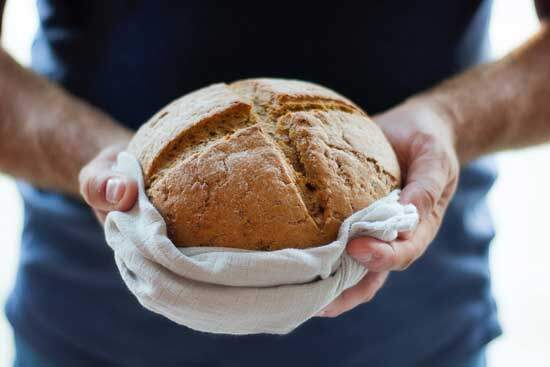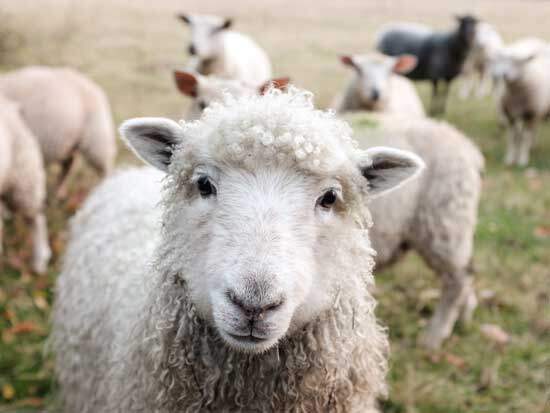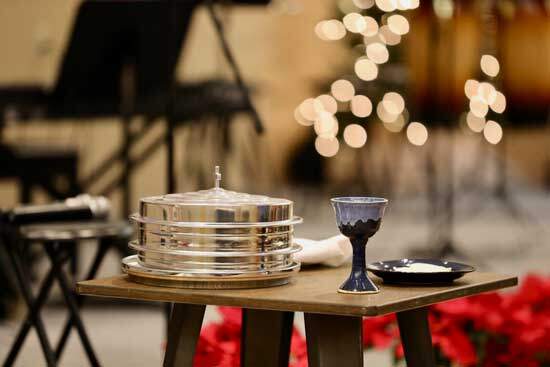What do Seventh-day Adventists Believe about the Lord’s Supper?
Like many Protestants, Seventh-day Adventists believe in the practice commonly called “The Lord’s Supper.” They take a drink and eat unleavened bread together in obedience to Jesus’ direct instructions to do it in remembrance of Him (1 Corinthians 11:24-25)
This post will walk you through the details of this practice, and why it’s so important to Adventists. You’ll learn:
- The Old Testament roots of the Lord’s supper
- What the Lord’s supper symbolizes (and what it doesn’t)
- What this ordinance means to Adventists
- Why Adventists practice foot washing and its spiritual importance
- Who can participate in these ceremonies (everyone)
The church’s official statement of belief explains the meaningfulness of the Lord’s Supper:
In this experience of communion, Christ is present to meet and strengthen His people.
As we partake, we joyfully proclaim the Lord’s death until He comes again.
Preparation for the Supper includes self-examination, repentance, and confession.
The Master ordained the service of foot-washing to signify renewed cleansing, to express a willingness to serve one another in Christlike humility, and to unite our hearts in love.
The communion service is open to all believing Christians.”
What is the Background of the Lord’s Supper?
As believers in the Bible, Adventists trace the ordinance of the Lord’s supper back to the final days of Jesus’ life. This supper is recorded in the Gospels and in Paul’s writings (1 Corinthians 11:23-25).
The Lord’s Supper, also called the Last Supper, has its background in the Passover—the Jewish celebration of the Israelites’ exodus from Egypt.
The Israelites were still enslaved by the Egyptians, yet God was working miracles on their behalf. On the night of the first Passover, the destroying angel “passed over” the homes of the Israelites and spared their first borns. But he killed the Egyptian’s first born children (Exodus 12:21-28).
The Jews still celebrate this feast as a memorial of their exodus from Egyptian captivity. And Christians also see it as an emblem or symbol of the death of Jesus on our behalf, which spares us from eternal death.
It was during Jesus’ last Passover celebration with His disciples that He transformed it into what we know as the Lord’s Supper.
“When the hour had come, He sat down, and the twelve apostles with Him. Then He said to them, ‘With fervent desire I have desired to eat this Passover with you before I suffer; for I say to you, I will no longer eat of it until it is fulfilled in the kingdom of God’” (Luke 22:14-16, NKJV).
It’s in this context that the first Lord’s Supper took place.
What Does the Lord’s Supper Symbolize?
 This whole celebration meal is largely symbolic. The original context of the meal is the first symbol, calling attention both to the Passover and to Jesus’ sacrificial death on the Cross.
This whole celebration meal is largely symbolic. The original context of the meal is the first symbol, calling attention both to the Passover and to Jesus’ sacrificial death on the Cross.
Even the items in the meal are symbolic. The bread is a symbol of Jesus’ body (Matthew 26:26) and the drink is a symbol of Jesus’ blood (Matthew 26:27-28).
Adventists believe we are only saved through Jesus and His sacrifice for us on the cross, which is why this ceremony is so meaningful.
By believing in Him and accepting His gift we have assurance of salvation, and this is what Christ alludes to during the Last Supper.
But this is not the only time Jesus refers to Himself as the bread:
And Jesus said to them, “I am the bread of life. He who comes to Me shall never hunger, and he who believes in Me shall never thirst” (John 6:35, NKJV).
And in the same way, Jesus says He’s the water, or drink, of life:
Jesus answered and said to her, “Whoever drinks of this water will thirst again, but whoever drinks of the water that I shall give him will never thirst. But the water that I shall give him will become in him a fountain of water springing up into everlasting life” (John 4:13-14, NKJV).
These are symbols of the spiritual fulfillment we can receive in Him. Just as food and water are necessary to live on Earth, acceptance of Jesus is necessary for eternal life.
The Bible continues to tell us that “as they were eating, Jesus took bread, blessed and broke it, and gave it to the disciples and said, ‘Take, eat; this is My body’” (Matthew 26:26; Mark 14:22, NKJV).
After the bread, “He took the cup, and gave thanks, and gave it to them, saying, ‘Drink from it, all of you. For this is My blood of the new covenant, which is shed for many for the remission of sins. But I say to you, I will not drink of this fruit of the vine from now on until that day when I drink it new with you in My Father’s kingdom’” (Matthew 26: 27-29; Mark 14:23; 25; Luke 22:20, NKJV).
And as a final directive, He instructed His disciples saying, “do this in remembrance of Me” (Luke 22:19, NKJV).
It’s in direct obedience to this instruction that Adventists practice the Lord’s Supper.
What Does the Lord’s Supper mean to Adventists?
 Beyond the symbolic connection of the Lord’s Supper to the Passover and Christ’s death, there are more symbols to consider. And one the Adventist church considers is the supper as a symbol of the New Covenant.
Beyond the symbolic connection of the Lord’s Supper to the Passover and Christ’s death, there are more symbols to consider. And one the Adventist church considers is the supper as a symbol of the New Covenant.
As we have seen, the Lord’s Supper took place during the time of the Passover. And this was both a symbol of the passover for the Israelities and Christ’s death on our behalf.
However, Jesus fulfilled that prophecy, and instituted this practice in its place. From this, you can tell that the Lord’s supper is closely linked to the Passover.
In a simple sense, one could say that the Passover was a symbol of the Old Covenant—God’s special relationship to ancient Israel (Exodus 34:27; 1 Chronicles 16:15; Psalm 132:12).
On the other hand, the Lord’s Supper is a symbol of the New Covenant, which is God’s special relationship with the church (Hebrews 8:13; 12:24).
During the ceremony, Jesus said that the bread was His body, and that the drink was His blood. What did Jesus mean by these statements about eating His body and drinking His blood?
Jesus was using symbolic language. He was expressing what it means to believe in Him, and to experience the reality of what He’s done for us.
He was using symbolic language to talk about what it means to be intimately connected to Him by faith. Jesus revealed what He was really talking about when He said that those who eat His body and drink His blood will “abide in Me, and I in him.”
Christians live out this new life that they have in Jesus by surrendering their lives to God, by obeying Him, claiming His promises, praying, and by studying the Bible and living according to what they learn.
And Adventists have this understanding as one of their statements of beliefs which says:
“Eating Christ’s flesh and drinking His blood is symbolic language for the assimilation of the Word of God, through which believers maintain communion with heaven and are enabled to have spiritual life . . . “Believers feed on Christ, the bread of life, though partaking of the Word of life—the Bible. With that Word comes Christ’s life-giving power” 1
This spells out the significance of the Lord’s supper.
It is an expression of what it means to have accepted Jesus as our Lord and Savior, all based on His death for us on the cross.
Is the Bread and Drink actually Christ’s Body and Blood?
The bread and drink are symbols for the purpose of remembrance. A great debate has existed in Christianity over the exact nature of the bread and drink used in the communion service.
Some believe it is literal—that it supernaturally changes into the blood and body of Jesus even if it looks like real bread and normal grape juice.
But there is no debate among Adventists.
Adventists don’t believe the bread and drink are anything other than bread and grape juice. Just like they don’t believe that going under the water in baptism supernaturally cleanses a person from sin.
Instead, the communion bread and drink are symbols of the believer’s surrender to Christ. It also serves as a memorial for Christ and a renewal of the commitment to have Him abiding in the believer’s heart.
Yet this supper is more than just a memorial meal.
It’s an open expression of our continued desire to serve the Lord. It is an acknowledgement of the salvation offered by His death, and the promise of eternal life which comes because of His broken body and shed blood.
Thus, the Lord’s Supper uses symbols to point us to what Christ did for us by dying on the cross where His body was broken and His blood shed.
Why Do Adventists Also Practice Foot Washing during the Lord’s Supper?
 Though this practice may not be widespread among most Christians today, Adventists believe that foot washing (John 13) should be part of the communion service.
Though this practice may not be widespread among most Christians today, Adventists believe that foot washing (John 13) should be part of the communion service.
This is because when properly understood, it gives us a powerful message of what it means to be followers of Jesus.
The Bible tells us that Jesus washed His disciples’ feet just before they had the last supper on that night. He did it to demonstrate humility and service to His disciples.
“After that, He poured water into a basin and began to wash the disciples’ feet, and to wipe them with the towel with which He was girded” (John 13:15, NKJV).
But Peter was aghast that Jesus, whom He believed to be his master and the promised Messiah, would stoop to wash his feet (John 13: 6-9).
However, Jesus insisted.
“Do you know what I have done to you? You call Me Teacher and Lord, and you say well, for so I am. If I then, your Lord and Teacher, have washed your feet, you also ought to wash one another’s feet. For I have given you an example, that you should do as I have done to you” (John 13:12-15, NKJV).
In these words of Jesus, Adventists find their biblical mandate to participate in the humbling practice of foot washing.
During Jesus’ time, the people walked everywhere and wore open sandals, so by the end of the day, their feet were filthy. And yet Jesus washed them.
With Jesus acting as our example, He shows us how to humble ourselves in service of others. If Jesus, the Messiah, can wash the feet of ordinary people, then no earthly man is too good to wash the feet of his neighbor.
It is this first act of complete humility that prepares the heart to participate in the practice of the Lord’s Supper.
What is the Spiritual Importance of Foot-Washing?
 Beyond the example of humility, we see another expression of Christ’s ultimate willingness to give Himself for us. Just like when He “made Himself of no reputation, taking the form of a servant, and coming to the likeness of men” (Philippians 2:7, NKJV).
Beyond the example of humility, we see another expression of Christ’s ultimate willingness to give Himself for us. Just like when He “made Himself of no reputation, taking the form of a servant, and coming to the likeness of men” (Philippians 2:7, NKJV).
Foot washing is also a symbol of washing and cleansing of the heart from sin and defilement.
Many times, the people who participate in foot washing have already been baptized. These ceremonies of remembrance are not meant to be in place of baptism but are a sacred practice for believers.
But foot washing stands for the fact that, just as washed feet quickly get dirty again, Christians need to be cleansed daily from “the sin which so easily ensnares us” (Hebrews 12:1, NKJV).
They are cleansed through repentance and forgiveness of sin.
Also, foot washing is a powerful reminder that in Christ, there is no distinction between the rich and the poor, the powerful and weak, the famous and the unknown.
At the foot of the cross, we are all equals—sinners in need of God’s grace.
Who can Participate in the Lord’s Supper in an Adventist church?
 Adventists practice what’s called “open communion.” Anyone who has accepted Christ can partake of the Lord’s Supper.
Adventists practice what’s called “open communion.” Anyone who has accepted Christ can partake of the Lord’s Supper.
Adventists do not require someone to be a member of the church to participate. But they believe that all who do should come to the service in an attitude of humility and repentance.
People receive the greatest blessing when they come in faith, leaning on the merit of Jesus who offered His body and shed His blood for us. They are willing to receive His offer of a new life in Him now, as well as the promise of eternal life.
[Interested in learning more about what Jesus did for humanity? Sign up today for Bible studies!]
[1] Seventh-Day Adventists Believe. General Conference of Seventh-day Adventists. 2005. P. 231.
Questions about Adventists? Ask here!
Find answers to your questions about Seventh-day Adventists
More Answers
Why Many Seventh-day Adventists Choose a Vegetarian Diet
Why Many Seventh-day Adventists Choose a Vegetarian Diet?You may have an Adventist friend who is vegetarian, or maybe you’re attending a Seventh-day Adventist Church for the first time and notice the potluck doesn’t have any meat. This isn’t unusual in Adventism. In...
The Health Benefits of Fresh Air You Should Know About
The Health Benefits of Fresh Air You Should Know About“When you can’t breathe, nothing else matters,” the American Lung Association tells us. And while that’s true, the kind of air you’re breathing will determine the health benefits you experience. Breathing fresh...
What Do Seventh-day Adventists Choose to Eat?
What Do Seventh-day Adventists Choose to Eat?Food blogs overwhelm the internet; food fads are all the rage; and copycat and healthy versions of food are the subject of many a get-together. Eating—and eating the best way—is a big deal. And everybody has a different...
10 Incredible Ways Sunlight Can Improve Your Health
10 Incredible Ways Sunlight Can Improve Your HealthAre you concerned about sunlight’s negative effects? You might be the one who lathers on the sunscreen and covers up when you go outside. Or maybe you avoid being outside as much as possible. You might be surprised,...
Why Is Water So Important?
Why Is Water So Important?We all know that water is a substance we can’t live without. It quenches our thirst and keeps us hydrated on the inside. And it’s necessary for hygiene and cleansing on the outside too. But did you know that the cleansing properties of water...
Ellen White’s Writings and the Adventist Health Message
Seventh-day Adventists are known for their emphasis on healthy living. And Ellen G. White was a significant influence in the development of this priority and practice among Adventists.
Health Clinics
Ellen White and Adventist Healthcare—Ahead of Their Time Medical care in the mid-1800s was primitive, to say the least. Basic concepts we take for granted—such as proper handwashing or recognizing the dangers of bloodletting—were nonexistent. And doctors often had...
What Did Ellen White Teach about Vegetarianism?
What Did Ellen White Teach about Vegetarianism?One thing you might have heard about Seventh-day Adventists is their emphasis on a vegetarian lifestyle. If you’re wondering why that is, it goes back to our church’s humble beginnings: As Adventists studied the Bible,...
How Ellen White’s Teachings Can Improve Your Health
How Ellen White’s Teachings Can Improve Your Health Healthcare in the nineteenth century was said to leave “more disease than it took away” with its use of bloodletting and “medicines” like mercury and arsenic.1 As people questioned these methods, new approaches...
Change Your Perspective on Life with These 5 Mindsets
5 Biblical Mindsets to Change Your Life for the Better Sometimes, life is just plain hard. There’s no way around it. So would thinking about things differently really change anything? Our perspective on life, and everything it throws at us, affects more than we’re...
Bible Promises for When You’re Worried or Fearful
Bible Promises for When You’re Worried or Fearful The Bible is full of beautiful promises that can comfort us in a variety of situations. They can give us hope when we are hopeless, make us feel grateful for God’s love, and comfort us when we’re grieving or suffering....
12 Practical Ways to Overcome Worry
12 Practical Ways to Overcome Worry DISCLAIMER: This content is for informational purposes only. It does not constitute any professional medical advice and is not intended as a substitute for professional mental health therapy. It’s easy to get stuck in a cycle of...
How the Bible Talks About Worry, Fear, and Anxiety
How the Bible Talks About Worry, Fear, and Anxiety Worry and fear are the ingredients of anxiety. It’s easy to see how the world isn’t perfect—and the anticipation of a bad event or experience (that may or may not even happen) can end up draining the peace and...
How to Calm Anxious Thoughts, Using the Bible
How to Calm Anxious Thoughts, Using the Bible You were expecting a phone call from your daughter half an hour ago, and she still hasn’t called. She’s also not answering your calls. You feel your heart thumping as your thoughts race: What if she’s been in a car...
What You Should Know About the Adventist Health Studies
What You Should Know About the Adventist Health StudiesYou may have heard that Seventh-day Adventists care about health. But what you may not know is that Adventists have been the subjects of long-term research into lifestyle and health. Since 1958, researchers from...
Benefits of Sunlight
Yes, There Are Health Benefits of SunlightDespite the bad reputation it’s gotten, sunlight is generally associated with positivity, as shown by songs like “You Are My Sunshine,” or phrases that refer to delightful people as having a “sunny disposition.” There’s a...
Why Your Body Needs Rest for Optimal Health
Why Your Body Needs Rest for Optimal HealthStruggling to think straight? Wondering why you can’t remember that important tidbit you heard earlier today? Feeling like your emotions are about to explode? These are just some of the symptoms that can reveal your need for...
The Seventh-day Adventist Diet: One of Our Key Longevity Secrets
The Seventh-day Adventist Diet: One of Our Key Longevity SecretsOats, avocados, lentils, tofu—probably not what you first think of in a standard American diet. But if you show up at the home of an Adventist, chances are you may be served one of these staples. Out of a...
Why You Need Fresh Air
Why You Need Fresh Air“When you can’t breathe, nothing else matters,” the American Lung Association tells us. We couldn’t agree more! Breathing in clean air is an essential part of caring for our bodies, which God has given us. Together with other health principles,...
Sabbath Meal
Everything You Need to Know About Sabbath MealsFor Seventh-day Adventists, sharing a Sabbath meal with friends and family is one of the most special and memorable parts of the Sabbath. That’s why we want to share with you all about Sabbath meals and why they’re such a...
Adventists and Healthy Living
Adventists and Healthy LivingWhat’s the Adventist “Health Message” All About? One thing Seventh-day Adventists are known for is their emphasis on living healthy lives. Since our bodies are living temples of the Holy Spirit (1 Corinthians 6:19, 20), we strive to stay...
Water’s Importance—Physical Benefits and Spiritual Applications
Water’s Importance—Physical Benefits and Spiritual Applications We all know that water is a substance we can’t live without. Not only does it quench our thirst and keep us hydrated from the inside, but it’s necessary for hygiene and cleansing on the outside as well....
How Important is a “Day of Rest?”
How Important is a “Day of Rest?” Why God Created a Day for Downtime by Martin Casper Do you ever experience the feeling of complete overload? Do you feel like the only way you can get ahead is by slamming it 24/7? I hear these types of comments more and more...
7 Reasons Why a Day of Rest is Important
7 Reasons Why a Day of Rest is ImportantWe live in a fast-paced world. It seems as if success is measured in how much you can do in a short amount of time. (Extra points for the service or product that is available 24/7). The idea that we will be more successful if we...
How do Adventists choose what to eat?
How do Adventists choose what to eat?Every day, parents go through the ritual of getting their kids to eat what is healthy and good while trying to steer them away from what can hinder the growth of their developing bodies. Nutritionists work with their clients to...
How Can I Have a Better Marriage?
Is it possible to have a happy marriage?
Why are many Adventists Vegetarian?
Why are many Adventists Vegetarian?The diet intended for man is outlined in Genesis 1:29, “And God said, ‘See, I have given you every herb that yields seed which is on the face of all the earth, and every tree whose fruit yields seed; to you it shall be for food.’”...
Didn’t find your answer? Ask us!
We understand your concern of having questions but not knowing who to ask—we’ve felt it ourselves. When you’re ready to learn more about Adventists, send us a question! We know a thing or two about Adventists.




















